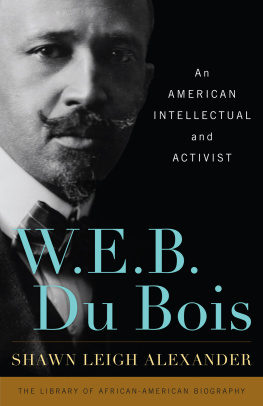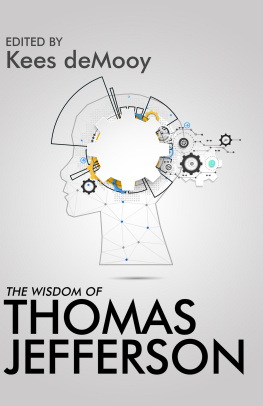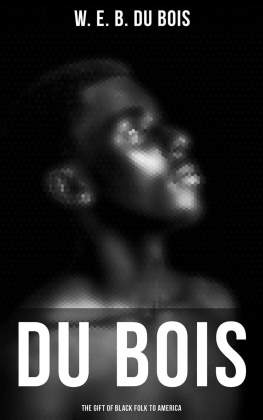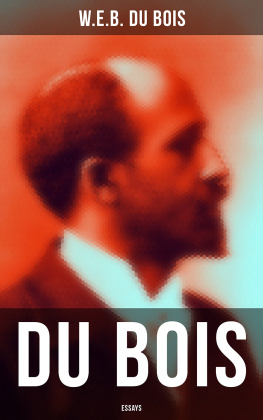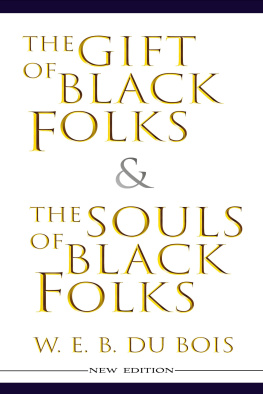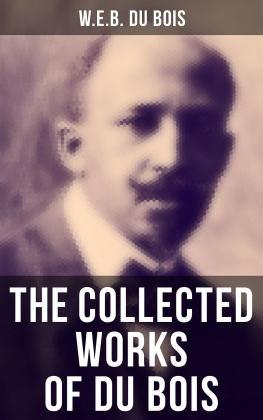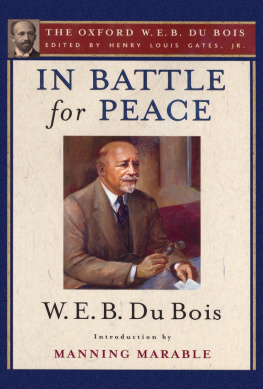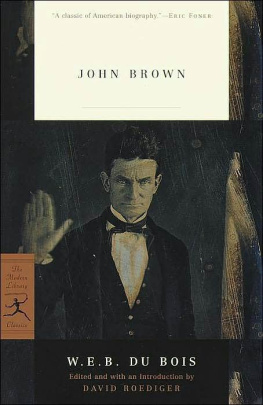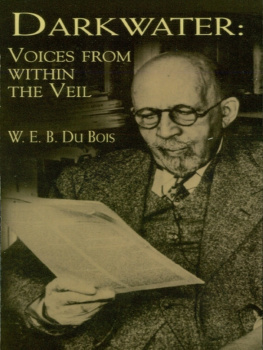To Wallace Edward Lloyd, Sr., for exceptional
demonstrations of love, strength, and wisdom.
And to Michael Porter, for honoring and extending the
Du Bois tradition of cultivating human potential and
steadfastly speaking Truth to Power.
CONTENTS
Introduction
Poetry, Prayers, and Parables
Expressing gratitude to Stephany Evans and Richard Ember for entrusting and blessing me with this, their beautiful brainchild.
And to John Earnest Carpenter, Jr.: Ships without anchors stand little chance of surviving the hurricane season; thanks for remaining one of my anchors.
I am one who tells the truth and exposes evil and seeks with
Beauty for Beauty to set the world right.
W.E.B. Du Bois
In the year that W.E.B. Du Bois was born, 1868, black elected officials in a South undergoing reconstruction used their newly gained legislative powers to begin a battle for the unimpeded civil rights and educational advancement of African Americans. That same year, the U.S. Congress passed the Fourteenth Amendment to the Constitution, confirming the citizenship of all persons born or naturalized in the United States, and reinforcing for African Americans the foundation of freedom established only a few years earlier by Abraham Lincolns Emancipation Proclamation and the Thirteenth Amendment. In the year that Du Bois died, 1963, one hundred years after the Emancipation Proclamation was issued, a quarter of a million black and white Americans converged on Washington, D.C., in an effort to conclude the battle begun in 1868, and that Du Bois waged his entire life.
It is not too much to imagine that upon his birth on February 23, 1868, Du Bois was baptized and branded in the flames of political debate that obscured the recent past, sought to define the present, and fought to mold the future. In his efforts to confront and correct the most destructive social and political issues of his time, W.E.B. Du Bois lived a rare, extremely courageous, and exceptionally committed life. Often dismayed by but generally unflinching in the face of perpetual adversity, he engaged the battle for equal human rights and for modern civilization itself as an educator, literary artist, international statesman (albeit one without official U.S. government sanction), and perhaps above all else, as an evolved spiritual being capable of at once fiercely excoriating his enemies with unrelenting condemnation and gently embracing them with fraternal compassion. For him, Booker T. Washington was not the oversimplified accommodationist of historical essays, but a leader whose principle failure was a lack of insight into the balance required between the individual integrity of black laborers and the political integrity of a predominantly white society. For him, the Ku Klux Klan represented not just an organization of hooded terrorists, but rather a group of people as oppressed by ignorance and Americas failure to eradicate racism as struggling blacks were.
Looked at through the windows of the past while standing firm in the cross-cultural currents of the present, the issues can appear exaggerated, inane, and at times terrifyingly surrealistic. Such issues as suffrage for African Americans and women; the apartheid system of segregation sentimentally referred to as Jim Crow; the hyper-real practice of genocide by lynching; and what Du Bois perceived of as a basic imbalance in the quality of life experienced between Americas haves and have-nots, were authenticated by history and validated by the divine potential of human beings to rise above such barbaric ignominy. What was less justifiable or excusable was not just one races basic assumption of superiority over another, but its apparently heartfelt belief that the other was not even human. That belief, Du Bois often pointed out, had led to all manner of social, political, sexual, and spiritual abuses, not the least of which, he felt, was that visited upon the heads of the oppressor rather than the oppressed. How was the darker brother to convince his lighter-hued kin that he was genuinely human and not some clever species of animal capable of aping human qualities? How was he to prove that whatever chains of despair or destiny bound one also bound the other? As blatantly preposterous as the debate over the humanity of blacks may seem nowa debate waged in popular magazines, scientific journals, lecture halls, churches, and the U.S. Congressdefenders of it were no less adamant or unapologetic in their beliefs then, than those proponents of eugenics who continue to champion similar beliefs in the modern era.
In the ninety-five years that composed his life, Du Bois never stopped fashioning the tools necessary to construct the bridges so crucial to relations between men and women, between the ignorant and the educated, the ideal of freedom and the application of democracy, between blacks and whites, whites and themselves, and blacks and themselves. His efforts to bridge these gaps started long before his contribution to the founding of the National Association For the Advancement of Colored People (NAACP) in 1910 and his legendary tenure as editor of the Crisis: A Record of the Darker Races. As early as 1897, he had already joined intellectual and spiritual forces with the dynamic educator and Episcopalian minister Alexander Crummell in the founding of the American Negro Academy, and in 1900 pledged himself to the ideals of global black unity at the first Pan African Congress, led by the Trinidadian Henry Sylvester Williams in London. His publication of The Souls of Black Folk in 1903 represented less an attack on the social philosophies of Booker T. Washington than the eloquent expansion and evolution of Washingtons indispensable accomplishments. Each of these achievements represented a weighted move to obliterate the propaganda that blacks were subhuman anomalies and to foster the ideal of the black, white, brown, and yellow races as one great human race.
Even with the founding of the seemingly militant Niagara Movement in 1905, the call was for an end to apartheid in America so that democracy might truly flourish and establish a genuine spiritual complement to Americas technological advances of the late 1800s and early 1900s. Should not the people who built the gleaming towers and speeding trains of Chicago and New York City cultivate characters equal to the beauty and wonder of their creations? As it was, the Niagara Movement provided a political springboard for the establishment and eventual success of the NAACP. The NAACP in turn provided Du Bois with the editorship of Crisis magazine for more than two decadesthe closest he would come to an official public office. Through the Crisis, he monitored and addressed the policies of one U.S. president after another, not just on matters pertaining to race but on those regarding war, the precarious ethics leading to the precarious economics of Wall Street, neo-colonialism, and the general state of the union. And along with James Weldon Johnson, Alain Locke, and Charles S. Johnson, he provided the drive, focus, and means for the phenomenal success of the celebrated Harlem Renaissance. Moreover, while he wrangled with the larger issues that shaped the destinies of nations via editorials and lectures and conventions, he could also make time to acknowledge in a letter such smaller issues as a father seeking advice on what books to buy for his children, or his own daughters contentment with the activities of her day.
The passion with which Du Bois gave himself to the struggle for human rights might seem to counter the fact that he was an avowed pacifist. Nevertheless, while he was not one who hungered for violent conflict, he did believe that, when confronted with it, one was obligated to seek resolution. As he stated in Crisis magazine in January, 1912: I am resolved to be quiet and law abiding, but to refuse to cringe in body or in soul, to resent deliberate insult, and to assert my just rights in the face of wanton aggression.
Next page


